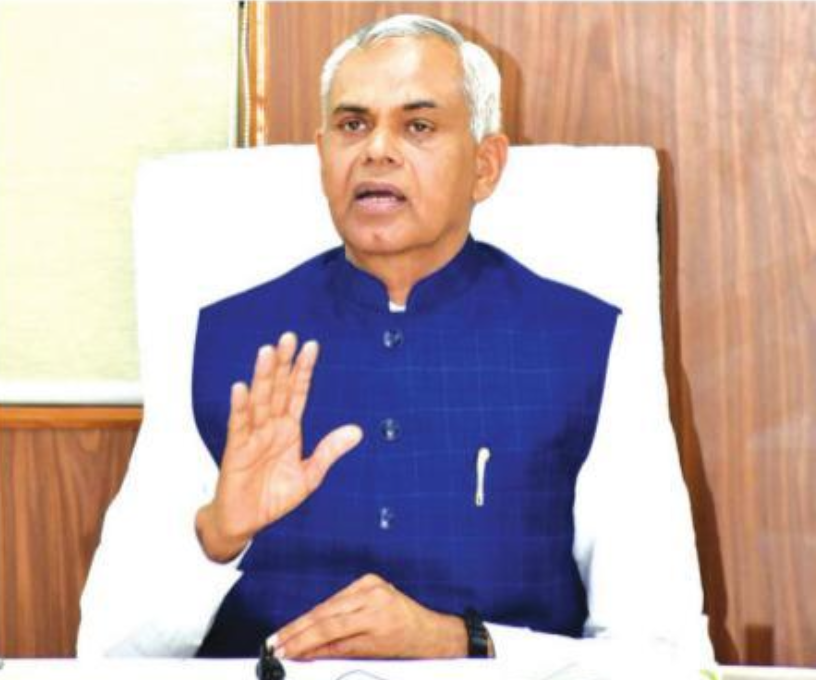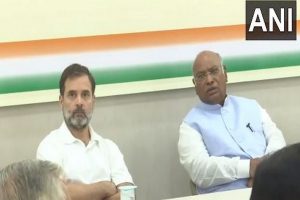The Union government’s decision to give a big push to zero-budget natural farming and Prime Minister Narendra Modi’s renewed focus on it has revived the hopes of a large section of the farming community. The decision to include natural farming in the syllabus of agricultural universities and Niti Aayog’s move to encourage chemical-free farming in all states are expected to go a long way in making farming sustainable.
Gujarat Governor Acharya Devvrat, who has been a proponent of natural farming and was instrumental in promoting traditional farming in various states, feels the decision to encourage zero farming, would help farmers become self-reliant and thus prove to be a game-changer. Seven years after being elevated to the gubernatorial post in Himachal from where he moved to Gujarat almost three years ago, Acharya Devvrat has carried forward the initiatives for zero farming, Swacchata Abhiyan, and anti-drugs campaign like a mission. Grounded and humble, the 63-year-old attributes the success of his initiatives to the commitment of grassroots workers and the vision of the Prime Minister, whom he says has always been a guiding force to him.

Elated at the encouraging response to the initiative of zero farming from various states, Acharya Devvrat, in a freewheeling interview with Shashi Kant Sharma, talks about his journey and various initiatives he has taken as Governor, which he says are an attempt to take forward the vision of the Prime Minister that hinges on ‘Sabka Saath Sabka Vikas’.
Q You have been instrumental in propagating natural farming since your early days as an educationist in Haryana. How far has this initiative been successful?
A: It has really kicked off well in different states. Here in Gujarat to it’s heartening to see that more than two lakh farmers have adopted natural farming. Several incentives like a sum of Rs 900 per month to those who are rearing cows and using cow
dung and its urine for farming have helped in creating awareness and in encouraging farmers to adopt this zero-budget farming. I am so glad that Niti Aayog has also included natural farming in its planning and is encouraging states to resort to it. This I am sure would be a game-changer in doubling the income of farmers while improving the condition of the soil. This for sure will take natural farming to a mass level.
Q. How far have the initiatives of natural farming succeeded in Gujarat?
A: We introduced the concept of natural farming while growing food for the residential education institutes for boys and girls in Haryana. The idea was propagated among farmers in Himachal and then in Gujarat. Today there are around two lakh farmers who are following natural farming in Gujarat alone. District Dang has been declared a ‘natural’ Zilla – the first district in the country to have been declared so. As many as 200,000 farmers in the district practice natural farming where no chemicals are being used. The farmers who have native cattle are being given Rs 900 a month for upkeep. The state is giving support to natural farmers to encourage them to continue farming.
Natural farming will not only bring profit to the farmers but also maintain soil health and reduce the growing disease burden due to the consumption of chemical-laced food. In fact, several other states have also been taking initiatives to promote zero-budget natural farming, and now the government’s emphasis through various policies like its inclusion in the agricultural universities’ syllabus would give it a much-needed push.
Q. You have been strongly advocating natural farming, but there are many who claim it’s not sustainable in India?
A: That’s a false notion. It’s pesticide-free and one of the most effective means of raising farmers’ income. It’s cost-effective. Nowadays you see so many cows being abandoned on roads. They can be taken care of, and their dung and urine can help greatly in nurturing the soil.
It’s after seeing the impact that the government has now made natural farming an integral part of Niti Aayog. I am grateful to the Prime Minister who is taking so many measures for the welfare of farmers. From soil testing to new seeds, from PM Kisan Samman Nidhi Yojana to increasing the MSP to 1.5 times the cost, from building a strong irrigation network to Kisan Rail, the government is all set to bring a positive change in the lives of farmers.
Q. What exactly is Zero Budget Natural farming?
A: Zero Budget Natural Farming is a promising tool to minimize the dependence of farmers on purchased inputs. It reduces the cost of agriculture by relying on traditional field-based technologies which lead to improved soil health. Desi cow, its dung, and urine play an important role from which various inputs are made on the farm and provide necessary nutrients to the soil. Other traditional practices such as mulching
the soil with biomass or keeping the soil covered with green cover around the year, even in the very low water availability situations, ensure sustained productivity even from the first year of adoption.
Q. A Governor’s post generally is perceived to be a political appointment. But one can see you working relentlessly for hours. What is it that aspires you to work so hard?
A: There is nothing unusual about me working for so long when one knows there is so much to do. If we look at Modi Ji, he works for almost 18 hours a day. Every one of us has a responsibility toward our nation and every citizen needs to work hard if we want to see our country progress. For taking forward the PM’s vision of promoting Indian culture and national integrity and bringing in the concept of a new India, everyone will have to do his bit. I get my inspiration from Modi ji though I know it’s not possible to match his exuberance and energy level. In fact, every one of us needs to take a cue from him.
Q You have been associated with education and social work for the last several decades and seem to be having no political affiliations. What really helped you in being chosen for this gubernatorial post which many see as a reward posting?
A: I was as surprised as anyone else when I came to know that I was being appointed as the Governor of Himachal Pradesh almost seven years ago. I had no political background or affiliations. It was perhaps in recognition of my work in the field of natural farming and education that I was chosen for this responsibility. I had never met Modi Ji, before being elevated as the Governor though I was always inspired by his vision and hard work.
Q You adopted a hands-on approach during Corona. Do you think the fight is over? What lessons need to be drawn from the pandemic?
A: Corona taught us that it’s mainly human beings who are causing harm to nature. There were too many lessons to be learned, the most important being that we need to get back to basics. We have the richest traditional culture and need to preserve it.
During Corona too, we had a meeting with religious leaders and appealed to them to come forward in countering the disease. They were more than willing to help. Premises of several religious institutes were opened for providing relief. The villages were linked digitally due to which monitoring became easier. The corona warriors were given regular food and aid. It was from much before Corona that the Prime Minister had been laying special emphasis on yoga and meditation. Yoga and meditation, which are inventions of India, are now being adopted by the entire world. In today’s context, it’s very important that the positive aspects of religion are promoted, and awareness is spread about them. It was due to timely and strong decision-making by that the country not only sailed through the crisis but also became a leader in granting aid to other nations.












